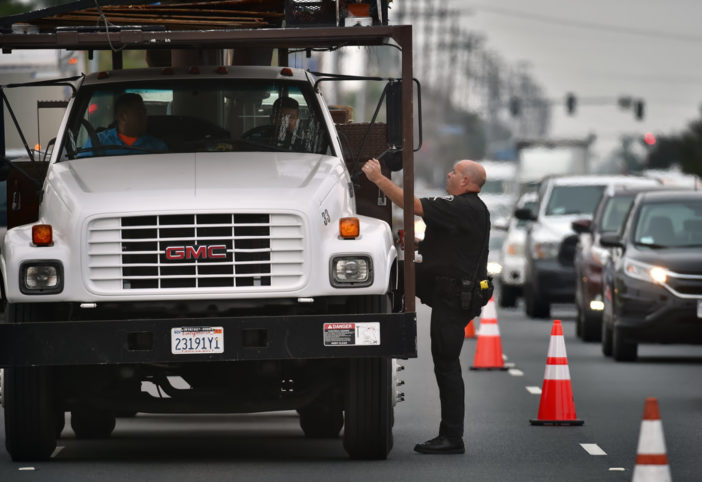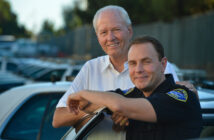The massive rock crusher only had to travel about two blocks to make it to the onramp to the freeway, where it would be allowed to operate because its owner had secured the necessary permit from the California Highway Patrol to have an extra legal load on a state highway.
Those two blocks down the city street turned out to be very costly.
When La Habra PD Officer Jason Coleman pulled over the rig carrying the mustard-yellow rock crusher in January and asked for the city permit to travel on the city road, the driver didn’t have one. Coleman used portable wheel load scales to determine that the rig weighed 135,000 pounds — way over the maximum 80,000-pound legal weight allowed on city roadways.
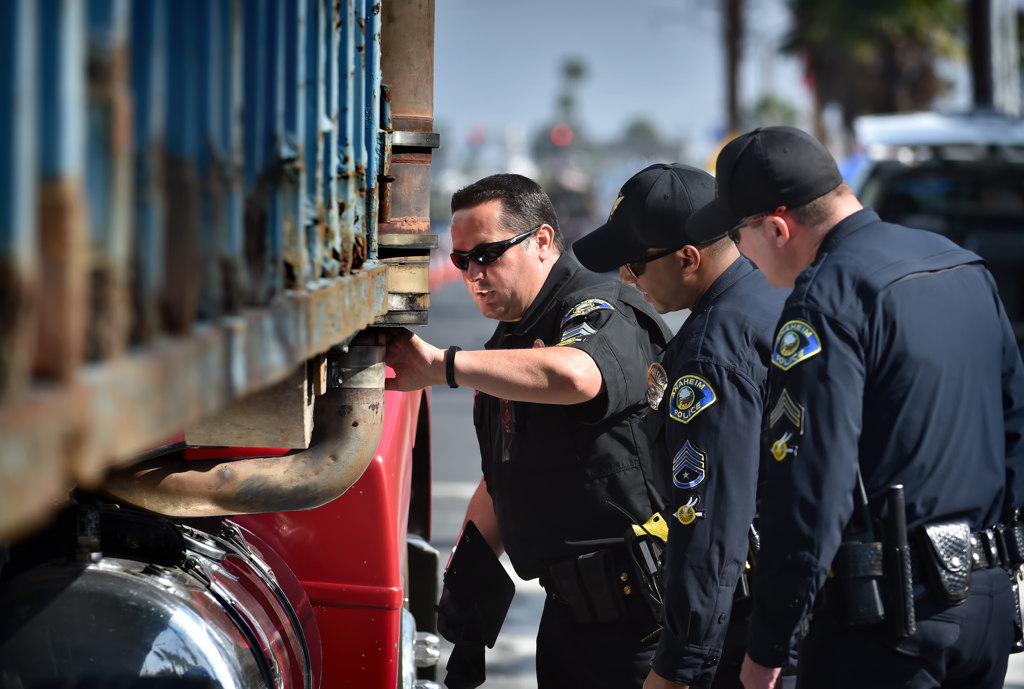
Anaheim PD Officer Phillip Grisotti, left, Sgt. Jonathan Bailey and Officer Robert Summers inspect a pipe on a truck to make sure exhaust fumes were not leaking into the driver’s cabin.
Photo by Steven Georges/Behind the Badge OC
“I told my boss I needed the permit, but he told me to drive anyway,” the driver told Coleman.
The permit to carry the load on city streets would have cost $15 had the business owner completed the paperwork with the city. Instead, the owner was issued a citation that could end up costing him about $15,000.
As the La Habra PD’s lone officer in charge of commercial traffic enforcement, Coleman regularly encounters commercial drivers working for bosses bent on cutting corners.
And such law-skirting commercial vehicle owners —- whose rigs are carrying everything from retail items to hazardous materials — are paying the price.
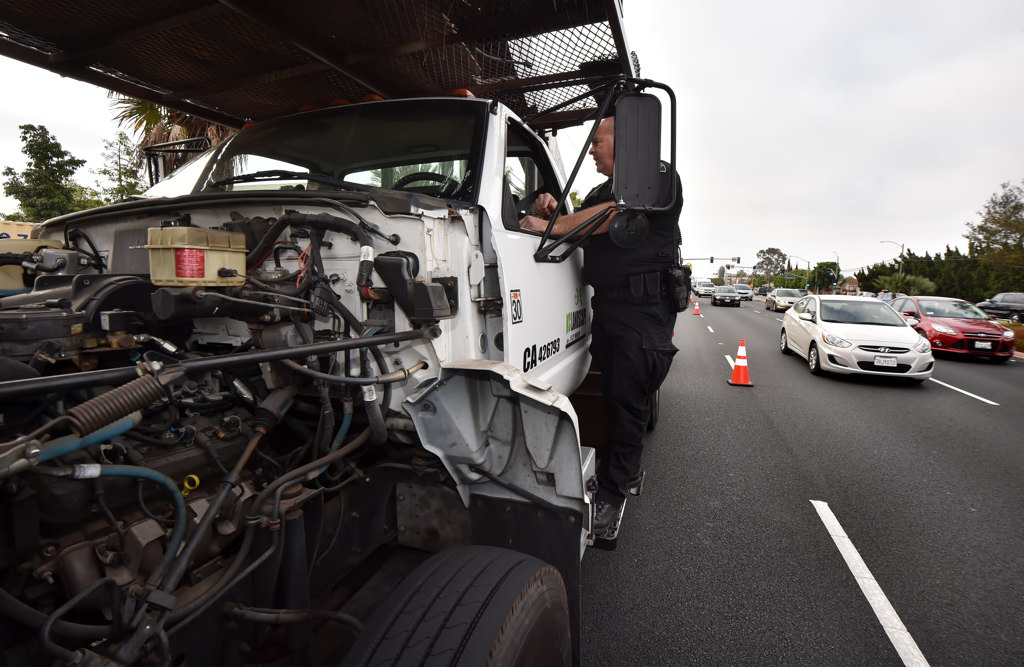
La Habra PD Officer Jason Coleman inspects a truck during a recent commercial checkpoint inspection that includes checking everything from safety lights and reflectors to looking under the hood.
Photo by Steven Georges/Behind the Badge OC
Officers like Coleman play a critical role at law enforcement agencies, which typically designate just one or two traffic officers to enforce commercial vehicle laws.
Coleman’s job is to protect city streets from unnecessary damage from heavy truck traffic and to ensure the trucks are in a safe operating condition. He makes sure commercial vehicles aren’t overweight (or if they are, that they have the required permits), that what they’re carrying is properly secured, and that drivers have the required licenses and medical clearances.
On Tuesday, April 24, Coleman joined several other agencies at a commercial enforcement inspection checkpoint along a stretch of Beach Boulevard in Anaheim — one of several he participates in throughout Orange and Riverside counties.
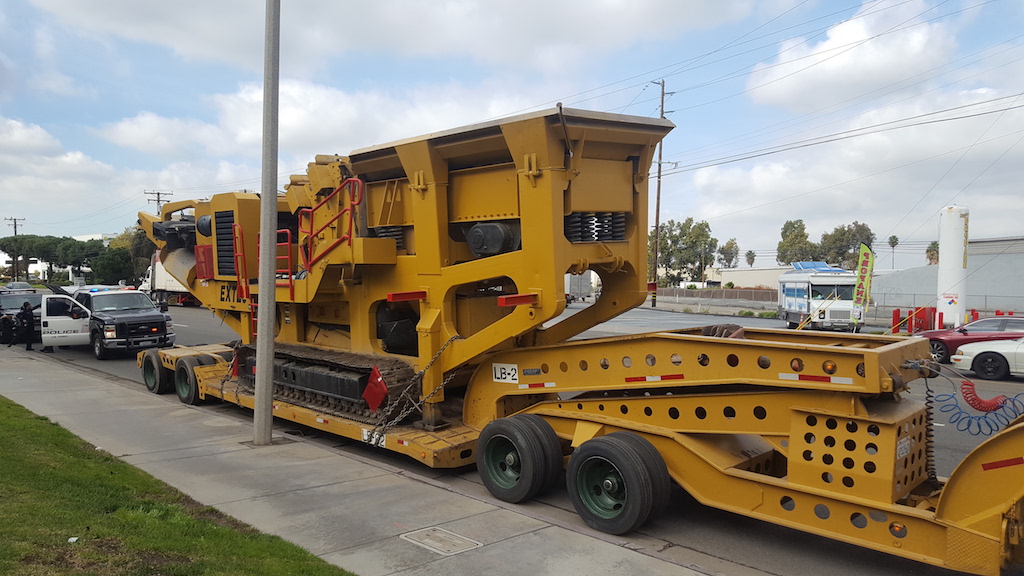
Officer Jason Coleman took this photo of a rig hauling a rock crusher that was 55,000 pounds over the legal limit allowed on city streets.
By the end of the roughly four-hour operation, 85 commercial vehicles had been inspected and 46 citations had been issued. Thirty-three trucks had been found to be in compliance, and seven trucks had to be placed out of service until problems were resolved.
Such statistics are typical at commercial enforcement inspection checkpoints, said Coleman, a former patrol and school resource officer who’s been in his current assignment for 4½ years.
“It’s different, it’s unique, it’s not your everyday, ordinary police work,” said Coleman, a 17-year veteran at LHPD. “Commercial truck traffic can affect a really large number of people. If one tractor gets in a crash, that’s a lot of damage that can be done.”
One tragic example is the death, in May 2014, of an off-duty LAPD police officer whose truck was hit by a full cement mixer that lost its brakes on hilly Loma Vista Drive in Beverly Hills. The driver of the cement mixer also died.
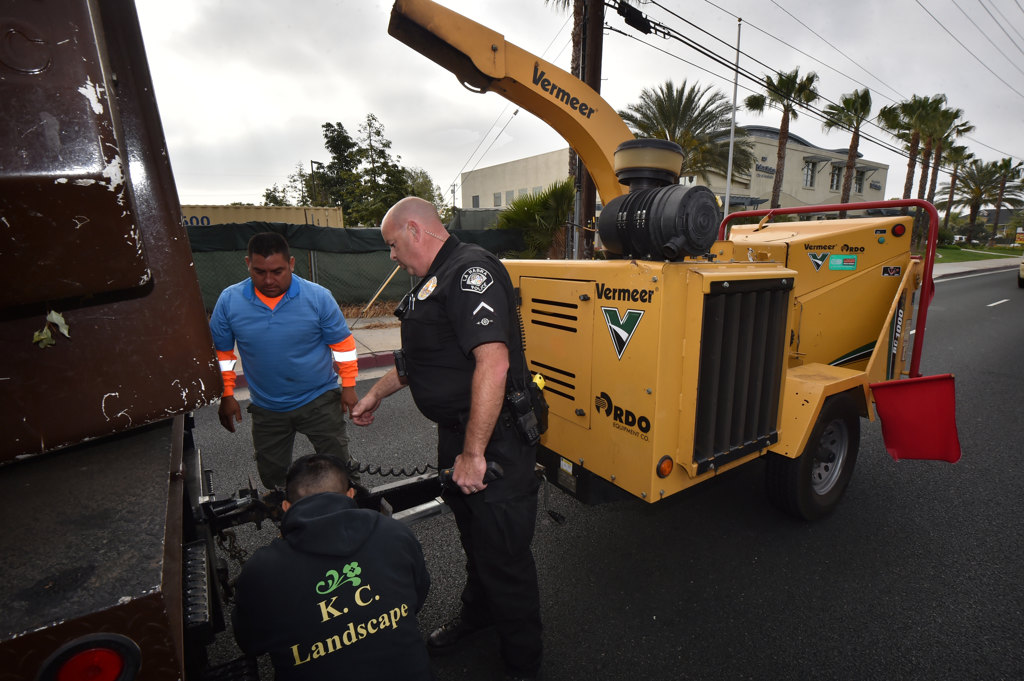
La Habra PD Officer Jason Coleman has the driver and passenger of a tree trimming/landscape truck fix a connection to the emergency brake for the trailer they were pulling.
Photo by Steven Georges/Behind the Badge OC
Although Coleman has yet to witness a similar tragedy on the streets of La Habra or elsewhere, he believes his work — and those of his counterparts at other law enforcement agencies — can save lives.
At the checkpoint, one driver’s emergency brakes weren’t working properly. Officers ordered him to get them fixed and put his truck out of service.
One driver wasn’t up to date on his medical certificate (commercial drivers are required to have medical examinations every two years).
Another driver, a landscape company employee hauling a wood chipper, had to wait an hour because he only had a Class C driver’s license but needed a Class A license. A colleague with a Class A license finally showed up to drive to the worksite in Fullerton.
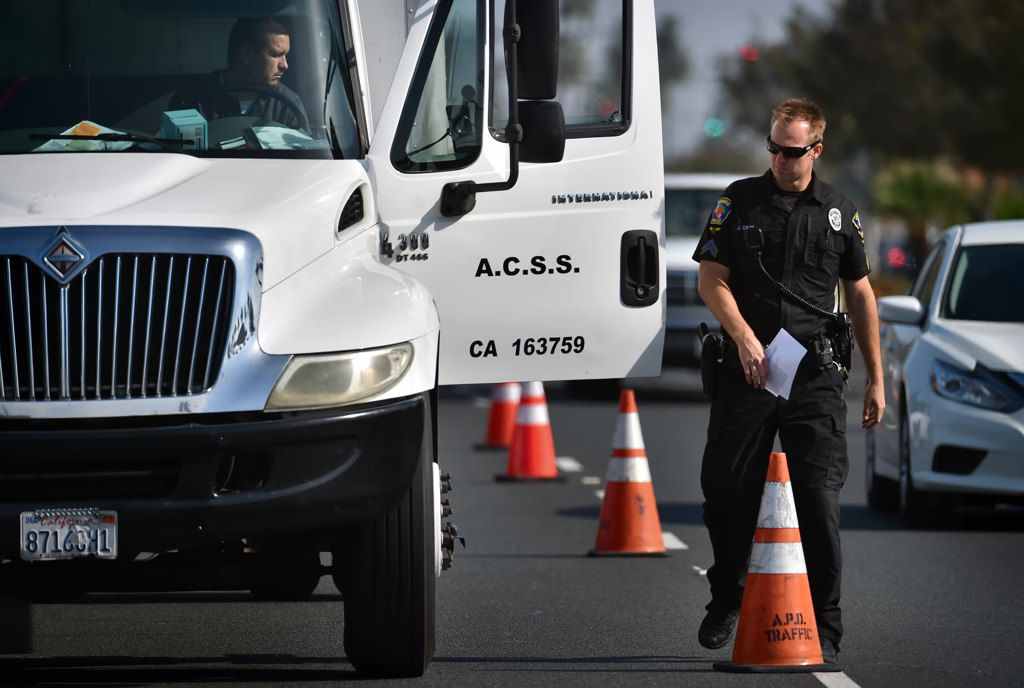
Orange PD Cpl. Jeff Gray inspects a truck along Beach Boulevard in Anaheim during a recent multi-agency commercial enforcement checkpoint.
Photo by Steven Georges/Behind the Badge OC
“He’s just trying to work and didn’t realize he had to have a commercial license to drive the truck,” Coleman said of the landscape employee, “but his employer should have known and manned the truck with a properly licensed driver.”
Anaheim PD Officer Phillip Grisotti ordered another landscaping truck to seal the metal gate in the back.
“Dirt was falling out of the gaps in the metal gate,” Grisotti said. “We don’t want things falling off trucks.” Unsecured loads and debris, of course, cause damage to vehicles and accidents.
The California Highway Patrol has the authority to set up commercial enforcement inspection checkpoints anywhere it wants, and Beach Boulevard is a common target since it’s a major thoroughfare for commercial vehicles in Orange County.
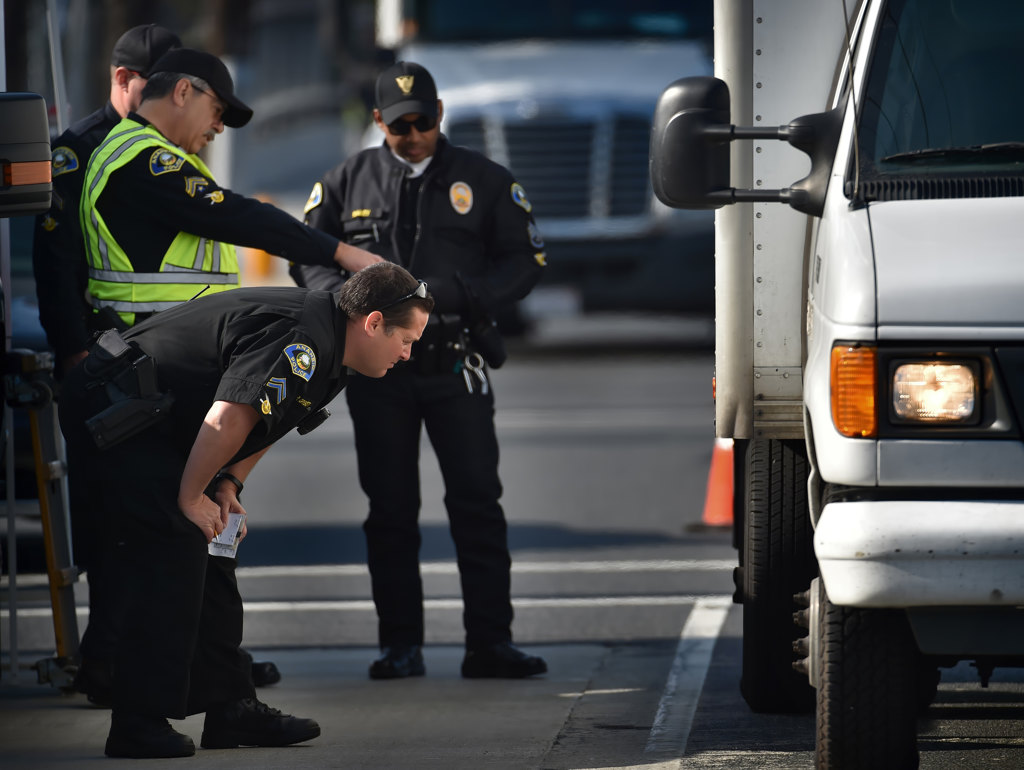
Front to back, Officer Phillip Grisotti, Officer Oscar Ayon and Sgt. Jonathan Bailey of the Anaheim PD give a commercial truck a thorough safety inspection during a checkpoint for commercial vehicles. Photo by Steven Georges/Behind the Badge OC
The Anaheim PD hosted the April 24 checkpoint along both directions of Beach Boulevard between Lincoln Avenue and Orange Avenue. In addition to the CHP and the Anaheim and La Habra PDs, the checkpoint involved officers from the Orange, Fullerton, Riverside and Chino PDs, as well as the Riverside County Sheriff’s Department.
Before he became a deputy for the Riverside County Sheriff’s Department, assigned to the city of Jurupa Valley, Eric Petersen drove commercial vehicles for a living.
One time, Petersen recalled, his boss threatened to fire him after he refused to drive on bad brakes. Petersen drove straight to the DMV for a voluntary brake inspection.
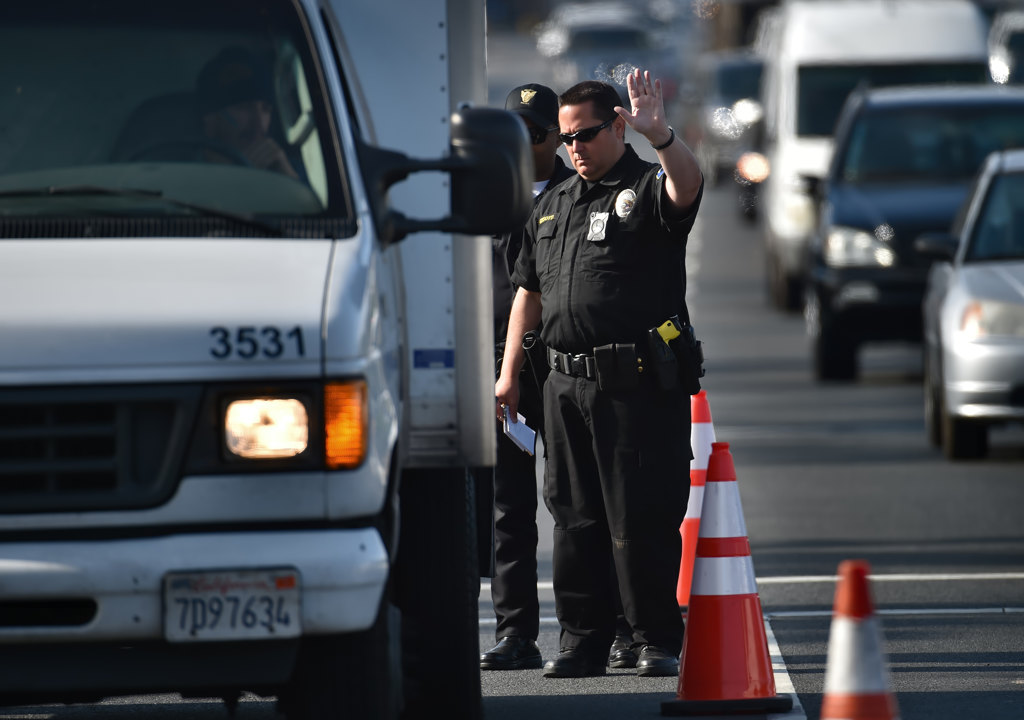
Anaheim PD Officer Phillip Grisotti conducts a safety inspection during a recent commercial enforcement checkpoint along Beach Boulevard in Anaheim.
Photo by Steven Georges/Behind the Badge OC
Most stops take between 30 minutes to an hour. Commercial vehicle enforcement officers have the authority to conduct full bumper-to-bumper mechanical inspections to make sure everything’s in proper working order.
“I enjoy it,” Petersen said of his assignment, which he’s been doing for three years. “There aren’t a lot of us who are trained to do this. As I see it, I’m not only protecting the public from bad drivers, but also the drivers from bad bosses.”
While on regular patrol, commercial officers must have a reason to pull over commercial vehicles, unless they are bannered “WIDE LOAD.” It’s just like any other traffic stop when dealing with commercial trucks — officers need probable cause to stop them.
At checkpoints, officers can wave over any commercial vehicle they want, because they are working under the umbrella of the CHP at the checkpoint.
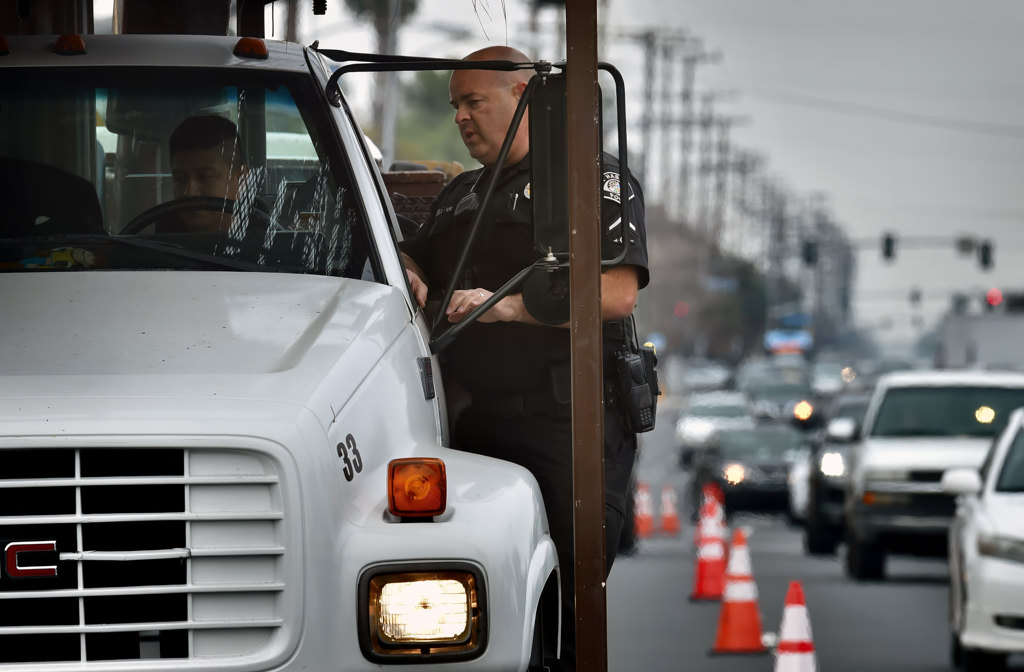
La Habra PD Officer Jason Coleman talks to the driver of a tree trimming/landscape truck during a commercial checkpoint inspection. The driver was found not to have the proper class driver’s license to drive a truck of that weight. Coleman decided against towing the truck and allowed the driver to call someone else from his company with the proper driver’s license to come pick up the truck.
Photo by Steven Georges/Behind the Badge OC
Commercial enforcement officers are specialized and patient. Finding a truck that is overweight, like the rock crusher Coleman stopped in January, is not a common occurrence, but when officers find a violation like that, it makes all the hard work and patience all worth it, Coleman said.
Commercial officers do more than enforce traffic laws — they keep drivers of big rigs safe, they keep the roadways safer and they save cities much-needed tax dollars by not having to repair roads and curbs damaged by errant off-route truck traffic.
A good commercial program, Coleman said, can save a city hundreds of thousands of dollars a year just by preventing damage to the roadways.
 Behind the Badge
Behind the Badge
